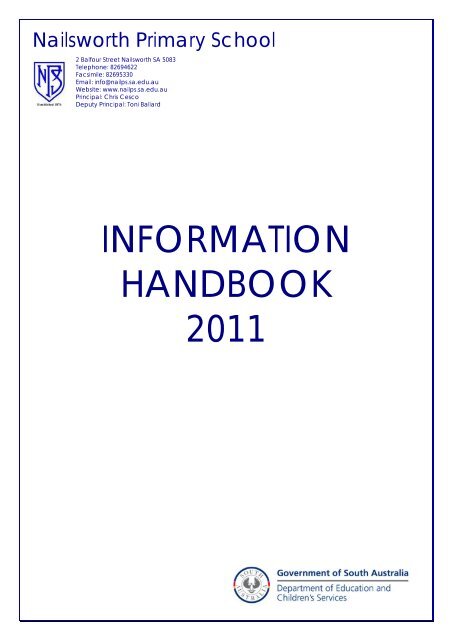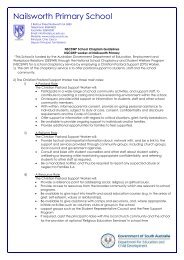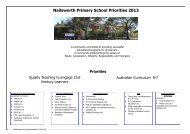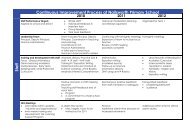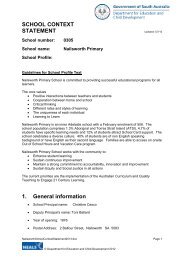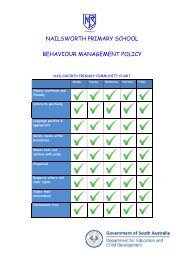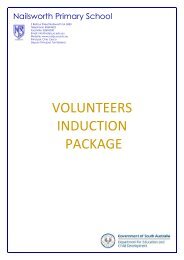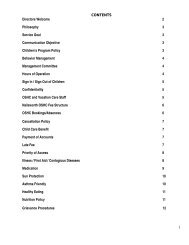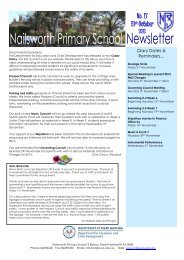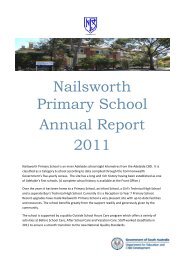INFORMATION HANDBOOK 2011 - Nailsworth Primary School
INFORMATION HANDBOOK 2011 - Nailsworth Primary School
INFORMATION HANDBOOK 2011 - Nailsworth Primary School
Create successful ePaper yourself
Turn your PDF publications into a flip-book with our unique Google optimized e-Paper software.
<strong>Nailsworth</strong> <strong>Primary</strong> <strong>School</strong><br />
2 Balfour Street <strong>Nailsworth</strong> SA 5083<br />
Telephone: 82694622<br />
Facsimile: 82695330<br />
Email: info@nailps.sa.edu.au<br />
Website: www.nailps.sa.edu.au<br />
Principal: Chris Cesco<br />
Deputy Principal: Toni Ballard<br />
<strong>INFORMATION</strong><br />
<strong>HANDBOOK</strong><br />
<strong>2011</strong>
FROM THE PRINCIPAL<br />
I would like to warmly welcome you and your family to <strong>Nailsworth</strong> <strong>Primary</strong> <strong>School</strong>. Our school works<br />
to provide a rich and rewarding education for our children from Reception to Year 7.<br />
I firmly believe that it is crucial that the parents, staff and children in our school community work<br />
together to provide the best possible educational opportunities for students. By working in<br />
partnership we can best assist our children in their intellectual, physical, social and emotional<br />
development.<br />
I look forward to meeting and talking with you during <strong>2011</strong>.<br />
Chris Cesco<br />
Principal<br />
At <strong>Nailsworth</strong> <strong>Primary</strong> <strong>School</strong> we strive to:<br />
� Provide a sound education for all students for their present time of life as well as for their future<br />
benefit.<br />
� Provide opportunities for each child to attain the highest level of competence of which he or<br />
she is capable in a wide range of cultural, academic, social and physical pursuits.<br />
� Promote attitudes in the school and in all teaching that are not sexist or racist and do not<br />
promote views of particular political parties or religions.<br />
� Provide a happy, secure and safe environment.<br />
� Provide a creative and stimulating program which encourages children and teachers to strive<br />
for excellence.<br />
� Provide successful experiences for each child.<br />
� Ensure that students gain an understanding and appreciation of different cultures and ethnic<br />
groups with emphasis being placed on communication, tolerance and co-operation as a<br />
community.<br />
� Prepare children for the adult world by ensuring intellectual, social, physical, emotional and<br />
moral development.<br />
We believe:<br />
� That the interaction between teacher and children is at the heart of schooling.<br />
� Close co-operation between home and school is vital. Teachers complement parents but do<br />
not take their place.<br />
� All children should be encouraged to ask questions, raise problems, make decisions by the<br />
democratic process and think critically and positively.<br />
2
ABSENCES<br />
In South Australia all school children up to the age of 16 are required by law to attend school regularly. All children are<br />
expected to attend on a regular basis. If your child is absent for any reason, you need to notify the school either by a<br />
note on their return to school or by telephone on the day/s of absence. Children who are absent without an<br />
explanation are reported to a DECS Attendance Officer. If you are going on vacation please notify the <strong>School</strong> Office<br />
and the child’s class teacher. If an absence is for longer than four weeks a formal DECS exemption has to be organised<br />
through the <strong>School</strong> Office. A note is required for shorter absences.<br />
ACTIVE FOR LIFE / SPORT<br />
PE is a specialist subject for all students at <strong>Nailsworth</strong> <strong>Primary</strong> <strong>School</strong>. We have a range of sporting activities at the<br />
school including Volleyball, Basketball, Netball, Cricket and Soccer. The Extra Curricular Committee liaises with Coordinators<br />
and reports to Council. Swimming is taught in a one-week block at the North Adelaide Swimming Centre in<br />
Term 4. Year 6/7 students benefit from a broader Aquatic Skills Program.<br />
ASSEMBLIES<br />
Assemblies are held in the <strong>School</strong> Hall. Parents will be notified of assembly times and the organising class via the term<br />
planner distributed in the Newsletter at the start of each term. Half of school assemblies are held weekly at 8:50am on<br />
Friday.<br />
BUILDING FUND LEVY<br />
There is $25.00 tax deductible Building Levy per student. We have this wonderful facility, which benefits all students. The<br />
levy helps us to make the payments on the Hall.<br />
CANTEEN<br />
The Canteen is run privately but under the guidelines of a <strong>School</strong> Governing Council Committee. The Canteen<br />
conforms with Healthy Eating Guidelines. When children wish to order their lunch, they bring their paper bag, clearly<br />
marked with their own name and their teacher’s name, plus their order written on the front. Wrap the money and<br />
place it inside the bag. Orders are placed by children in the class lunch box. The lunch box is taken to the canteen<br />
and before lunch, monitors collect the lunches and return with them to the classroom. A price list of items will be sent to<br />
each family, at the beginning of each term or when price rises are necessary. Lunch bags can be purchased from the<br />
canteen.<br />
Children are not permitted to leave the school grounds to buy their lunch.<br />
CAR PARKING<br />
For the safety of the children, parents are not to bring their cars into the school grounds to deliver or collect children.<br />
(By grounds, we mean ALL AREAS within the school boundary including the teacher’s car park and general<br />
playgrounds, including Prospect Gallery Car Park). Motorists are required to observe parking restrictions (signs posted)<br />
between 8:15am – 9:15am and 3:00pm – 4:00pm daily and the school zone speed limits. Please take care to observe<br />
the Drop Off Zone and Emu Crossing on Thomas Street.<br />
CHRISTIAN PASTORAL SUPPORT WORKER<br />
<strong>Nailsworth</strong> <strong>Primary</strong> <strong>School</strong> is fortunate to have the services of a Christian Pastoral Support Worker, Marilyn Wilson. Marilyn<br />
provides a service of pastoral care for students and their families who want the support. Christian Pastoral support<br />
Workers are not in schools to evangelise on behalf of a particular faith group. Their role requires them to respect both<br />
the secular character of the school and the variety of thoughts and beliefs within the school community. As a Christian<br />
presence in the school, they respect and encourage key Christian values and celebrate the diversity of Christianity.<br />
CLASS COMPOSITION<br />
Class composition changes each year depending on the number of children at each year level. Most classes will be<br />
made up of more than one year level. Junior <strong>Primary</strong> classes are based on a maximum of 26 while Years 3-7 have 30<br />
students.<br />
COMMUNICATION<br />
Teachers regularly distribute class and school information. Our aim is to keep parents fully informed. Most students<br />
Years 3-7 maintain a school diary. Please regularly check and sign your child’s diary.<br />
Diaries are used for:<br />
� notes to teachers<br />
� absentee notes<br />
� student comments<br />
� homework instructions<br />
� day-to-day reminders<br />
3
COMMUNITY INVOLVEMENT<br />
Presently, families and friends of the school are involved in:<br />
� Governing Council<br />
� Parents & Friends Association<br />
� Library Assistance<br />
� Classroom Assistance<br />
� Sports Coaching, Managing<br />
� Camps and Excursions<br />
� Parents Assisting Learning Program<br />
� <strong>School</strong> Grounds Development<br />
All volunteers must have a current CrimTrac (Criminal History Screening) clearance.<br />
CONTACTING THE SCHOOL<br />
The school telephone number is 8269 4622 (Fax no. 8269 5330). Parents are requested not to telephone with messages<br />
for children unless they are urgent. If you have any queries or concerns, please feel free to contact the Principal or<br />
Deputy, who will return your call. Children are not permitted to use a telephone unless the matter is a serious one.<br />
Mobile phones are definitely discouraged and must be handed in at the Front Office each morning. The general e-mail<br />
address for the school is info@nailps.sa.edu.au.<br />
CUSTODY<br />
Sensitive situations can arise involving children whose parents are either divorced or separated. The Family Court is<br />
empowered to make orders concerning custody. Such orders need to be on file. Where there is doubt, the Principal<br />
will abide by the guidelines of Crown Law. The interests of the child are uppermost at all times.<br />
DENTAL CLINIC<br />
The school Dental Service offers a comprehensive oral healthcare program for South Australian children under the age<br />
of 18 years. Fees may apply. The local service is located at Prospect <strong>Primary</strong> <strong>School</strong>, Gladstone Road, Prospect. Phone:<br />
8269 4579. Parents are responsible for making appointments and taking their child to the clinic.<br />
DRAMA<br />
For the <strong>2011</strong> school year each student will have 45 minutes per week for 2 terms. Drama is programmed in the <strong>School</strong><br />
Hall. Drama electives run for specific year levels at lunch time.<br />
EARLY BIRD READING ROOM<br />
We have an Early Bird Reading Room. The Early Bird Program is run in Room 10 by Mrs Papadopoulos. Identified<br />
students are invited to visit the room four times a week. Many successes in reading have evolved from this program.<br />
EARLY DISMISSALS / LATE ARRIVALS<br />
If your child/ren arrives late they need to sign in the Late Arrivals Book. If you need to take your child/ren out of school<br />
you will need to sign the Early Dismissal Book and be issued with a pass to give to the child’s teacher. Both books are<br />
located in the front foyer. When you return a chil/ren from appointments, please initial the entry in the Early Dismissal<br />
Book. Parents need to accompany the child/ren and sign in if arriving after 9.00am.<br />
EARLY YEARS JUNIOR SCHOOL POLICY<br />
Intakes<br />
Term 1 (January/February) will have 12 terms in Junior <strong>Primary</strong> classes.<br />
Term 2 (April) will have 11 terms in Junior <strong>Primary</strong> classes.<br />
Term 3 (July) will have 14 terms in Junior <strong>Primary</strong> classes.<br />
Term 4 (October) will have 13 terms in Junior <strong>Primary</strong> classes.<br />
EMERGENCY (FIRE DRILL OR LOCK IN)<br />
All personnel will be immediately evacuated to the school oval (or inside), where a roll call will be made.<br />
Lock-ins are practised in case of an emergency. All students will be in classrooms. Room 10 students and staff will go to<br />
the downstairs art area of the main building.<br />
ENGLISH AS A SECOND LANGUAGE<br />
The school has an extensive support program for children whose mother tongue is other than English. Interpreters can<br />
be organised where necessary. The school uses Bilingual <strong>School</strong> Support Officers to support new arrivals students.<br />
ENROLMENT / TRANSITION<br />
Children who have turned 5 years of age may start school at the beginning of each term. Enrolment is appreciated well<br />
in advance so that students and families can benefit from our Transition Program. New students will be invited to attend<br />
a full day transition visit. Students will meet their teacher and fellow students. The Parents and Friends Committee will<br />
welcome you to the school, provide a tour of the school and ensure time to organise uniforms. The Principal will be<br />
present for any questions you may have. At the end of the day, you will meet the teacher while students visit the school<br />
Library. (Students need to turn 5 by the second Monday of the Term, they can commence on or after their birthday.)<br />
4
EXTENDED METHODOLOGIES<br />
Students Years 2-7 are tested on the Raven’s test. Identified students work in the Extended Methodologies Program.<br />
Class teachers use programs to assist all students develop their gifts and talents.<br />
FINANCE OFFICE<br />
Money for different purposes should be placed in sealed envelopes labelled with the child’s name and room number.<br />
Consent notes need to be enclosed with the money. Money is taken to the Finance Office where a receipt is issued<br />
directly or sent home via the afternoon message distribution.<br />
The Finance Office is open: 8:30am – 9:30am Monday – Friday<br />
3:00pm – 3:30pm Monday - Friday<br />
THE ROLE OF GOVERNING COUNCIL<br />
The Council meets approximately eight times per year commencing at 7:30pm in the Staff Room and usually continues<br />
until approximately 9:30pm or 10:00pm. The Council follows a set agenda with reports from all committees. Members<br />
of Council can put forward topics they feel should be covered at the meeting.<br />
The agenda is as follows:<br />
Apologies<br />
Minutes of last meeting<br />
Business arising from minutes<br />
Correspondence<br />
Reports from committees and groups are tabled:<br />
Extra Curricular<br />
Class Reports<br />
Student Representative Council<br />
Education<br />
Facilities<br />
Fundraising<br />
Finance<br />
Principal<br />
OSHC<br />
Canteen<br />
(PFA is an affiliated body)<br />
Any other Business<br />
Date of next meeting<br />
There are some short-term special interest committees e.g. Computing/Technology.<br />
The Annual General Meeting (AGM) is held in Term 1 each year and all parents are invited to attend. Nominations are<br />
called, and you may nominate yourself if you wish to be on the Governing Council. Members may be elected for only<br />
one year if they choose, but the normal term is two years. There are positions of President, Vice President, Secretary<br />
and Treasurer and parents are elected to these positions annually. The Council is then divided into Committees and<br />
parents may choose which particular area interests them the most.<br />
Each Committee has three or four Council members and these Committees may vary and change as the needs of the<br />
school are met. Parents who are not on Council may be on Committees of the Governing Council.<br />
The Education Committee aims to keep parents informed of changes occurring in education and occasionally host<br />
speakers cover areas such as Maths, Literacy, Boys in Education, Program Achieve etc. In the past they have looked at<br />
different areas of school policy, as well as attending meetings held by different parent organisations, with members<br />
then reporting to Council on the topics discussed.<br />
The Facilities Committee is responsible for improving the playground equipment and grounds. They also arrange<br />
working bees to maintain the grounds, e.g. weeding, erecting equipment, spreading bark chips etc.<br />
The Finance Committee oversees budget expenditure on a monthly basis and provides additional information for<br />
Council on large financial outlays. It prepares draft budget proposals during November and invites budget submissions<br />
from interested groups operating within the school. It monitors bad debts, recommends school fee limits and ensures<br />
monies are expended within DECS guidelines.<br />
The objectives of the Extra Curricular Committee are:<br />
To promote the development of activities for children.<br />
To encourage school community involvement.<br />
To encourage each activity to become autonomous.<br />
To continue to provide opportunities for girls to be more involved.<br />
5
The Fundraising Committee and PFA works with the school community to raise funds for initiatives in the school.<br />
Meetings are informal and friendly and are open to parents who wish to sit in. Being a member of the Governing<br />
Council provides a real opportunity to get to know your school better by becoming involved with other parents who<br />
have the interests of their children at heart.<br />
HOMEWORK<br />
Teachers will set homework within the following guidelines:<br />
Years R – 4 Could be expected to spend no more than 30 minutes 4 nights/week on homework. Reading<br />
is encouraged for all students.<br />
Years 5 – 7 Could be expected to spend no more than 45 minutes 4 nights/week on homework.<br />
Teachers may give homework in various forms e.g. reading, completing work set in class, revising, editing, collecting,<br />
organising material, interviewing or watching a special television program. If the class has more than one teacher they<br />
will organise the management of homework.<br />
ILLNESS OR ACCIDENT<br />
A medical form is to be completed for each child at the start of each school year.<br />
Sick room facilities are available for illness or accident. First aid is administered by trained school staff. If your child has<br />
a specific health problem which requires medication, a health plan signed by your doctor is required. Children with<br />
Asthma need an Asthma Plan signed by the Doctor. Students with allergies need to have a health plan lodged with<br />
First Aid Staff. If your child is on prescribed medication, please notify the school. We do not administer any pain-killing<br />
drugs, eg. Panadol. By negotiation, staff may volunteer to observe children administering their own medication. If your<br />
child has an accident at school you will be contacted by phone. If further treatment is required, medical advice will be<br />
sought and/or an ambulance called. In the case of minor accidents, first aid will be provided by the staff and a<br />
proforma note sent home advising parents to seek medical attention as required. Before your child starts school it is<br />
important to arrange for a medical check-up and make sure all vaccinations are up to date eg. measles, mumps,<br />
whooping cough, diphtheria, tetanus and polio. We suggest that children be kept at home when there is doubt about<br />
health.<br />
The following DECS guidelines apply:<br />
Exclude until fully recovered or for at least 5 days after eruption first appears. Note<br />
Chicken Pox<br />
that some remaining scabs are not a reason for continued exclusion<br />
Conjunctivitis Until there is no discharge from the eyes<br />
Diarrhoea Exclude until diarrhoea ceases<br />
Slap Face Exclusion is not necessary<br />
Hand, Foot & Mouth Disease Exclude until blisters have dried<br />
Head Lice Until treatment has rid hair of all nits and lice<br />
<strong>School</strong> Sores (Impetigo) Until the sores have healed or are properly covered with a dressing<br />
Influenza Exclude until well<br />
Measles Exclude for at least 4 days after the onset of the rash<br />
Mumps Exclude for 9 days or until swelling goes down (whichever is sooner)<br />
Ringworm/Tinea Exclude until the day after appropriate treatment has commenced<br />
Rubella (German Measles) Exclude until fully recovered or for at least 4 days after the onset of the rash<br />
Whooping Cough Exclude for 5 days after starting antibiotic treatment<br />
Worms Exclude if diarrhoea present<br />
LANGUAGES OTHER THAN ENGLISH (LOTE)<br />
Italian or Greek are the language choices presented to students in the Language Other Than English Curriculum.<br />
Children from Reception to Year 7 learn about the language, the country, the people and the culture. The children<br />
may also participate in the festivals organised outside of the school, eg. Glendi, Carnivale. Children from these cultural<br />
backgrounds are given preference in their language choice.<br />
NAPLAN<br />
LITERACY AND NUMERACY TESTS are administered to children in Years 3, 5 and 7 annually in Term 2. A data base is<br />
maintained to track all students’ progress .<br />
LOST PROPERTY<br />
All belongings need to be clearly named. A lost property container is provided and is situated near the inside stairs. At<br />
the end of each term unclaimed/unnamed items of school clothing are included for sale at Second Hand Sales run by<br />
the PFA.<br />
MATERIALS & SERVICES CHARGES<br />
Materials and Services charges are set by the <strong>School</strong> Governing Council. Accounts are posted home at the beginning<br />
of the school year. The school relies on payment of these fees. The fees for <strong>2011</strong> are $240.00.<br />
MOBILE PHONES<br />
Students are not permitted to have Mobile Phones. Student phones are stored in the front office during school hours.<br />
They are kept in drawers in the Admin office.<br />
6
MUSIC<br />
The school has a specialist violin program which occurs during school hours. Twelve violins are available. Children are<br />
tested in Year 3 and placed on a priority list according to attitude and musical aptitude. As vacancies occur children<br />
are offered the opportunity to be part of the program. These lessons are provided by a DECS specialist teacher.<br />
Keyboard, Fife, Recorder, Guitar and Flute tuition is also offered at <strong>Nailsworth</strong> through outside providers.<br />
Singing is particularly important at <strong>Nailsworth</strong> <strong>Primary</strong> <strong>School</strong>. Senior Choir is available for Years 5, 6 and 7 students.<br />
Junior Choir is available for Years 2, 3 and 4. A highly skilled Choir Trainer leads both Choirs. All junior students benefit<br />
from weekly singing lessons.<br />
NEWSLETTER<br />
A school Newsletter is sent home every second Wednesday with the eldest child of each family. It is the main form of<br />
communication between the school and families and should be read carefully so that notices about school closures,<br />
school events and information are not missed. Some classes also have class newsletters that go home at regular<br />
intervals. Newsletters are available on the school website www.nailps.sa.edu.au.<br />
OUT OF SCHOOL HOURS CARE (OSHC) (BEFORE AND AFTER SCHOOL CARE AND VACATION CARE)<br />
Out of <strong>School</strong> Hours Care is run by a Management Committee which is responsible to Governing Council. It operates<br />
from 6:45am before school and 3:15pm – 6:15pm after school. The Director, Leith Stace, can be contacted after<br />
2:30pm each day on 83449700. Messages may also be left on the Centre’s answering machine during the day. An<br />
information booklet is available for parents which includes the fee structure. Accounts are sent home each fortnight via<br />
the school’s internal mail. All information is available on www.nailps.sa.edu.au link OSHC.<br />
PARENTS ASSISTING LEARNING (PAL)<br />
This is an important student support program. It is a rewarding experience for both the nominated students and the<br />
volunteers. No special skills are needed by volunteers – just a kind heart, a friendly smile and 40 minutes a week. A<br />
current Criminal History Record Check is required prior to volunteering.<br />
PARENTS & FRIENDS ASSOCIATION (PFA)<br />
The PFA meet twice per term. Meetings are only held during the school term. All parents are most welcome to attend<br />
and the dates of each meeting are notified in the school Newsletter. Official positions of Chairperson, Vice<br />
Chairperson, Secretary and Committee members are filled at the AGM which is usually held in Term 1. These positions<br />
are held for a one year term. One of the executive is appointed to attend Governing Council.<br />
Traditional fundraising activities include Sausage Sizzles, Mother’s and Father’s Day Stalls, Lamington Drives, Cake Stalls<br />
etc. Some purchases have been computer equipment, games, dictionaries, musical instruments and sandpit toys. PFA<br />
plays a vital part in the school’s Transition to <strong>School</strong> program.<br />
PHOTOGRAPHS<br />
Each year a commercial photographer is invited to the school by the Parents and Friends Association to take class and<br />
sporting photographs. Parental consent is required for individual and family photographs to be taken. These photos<br />
are prepaid to the photographic company.<br />
REPORTING AND ASSESSING<br />
This is a vital part of working together to benefit students. A Meet the Teacher Night is held early in Term 1. The school<br />
has a formal policy including 2 written reports and a Parent Teacher Interview. However, please feel free to telephone,<br />
write or visit to arrange an appointment should you wish to meet with teachers (phone 82694622). Interviews and<br />
reports provide information on student progress. From time to time examples of student’s work will be sent home.<br />
RESOURCE CENTRE<br />
The Resource Centre is a vital part of <strong>Nailsworth</strong> <strong>Primary</strong> <strong>School</strong>. The Centre provides resources for parents, staff and<br />
students (Reception to Year 7). Students have access to Internet computer work stations. A new resource centre will be<br />
available mid 2010. A senior computer room will be established during 2010. An electronic white board with Internet<br />
access has been installed to enhance Resource Based Learning.<br />
Di Glouftsis, Teacher/Librarian, provides an environment that values:<br />
� Literature and the enjoyment of reading.<br />
� Information and research skills.<br />
� Personal borrowing of books is encouraged during weekly class borrowing sessions, and every lunch time.<br />
� All students are encouraged to participate in the Premier’s Reading Challenge.<br />
7
Lower <strong>Primary</strong> children need to use library bags to help protect library books. The Resource Centre is open each lunch<br />
time for 30 minutes when children may borrow, play quiet games, use the computers/CD ROM, do art and craft<br />
activities, puppetry, writing and of course, read. Parents can help encourage children by:<br />
� sharing the borrowed books with their children,<br />
� discussing the selection of books,<br />
� encouraging appropriate care of books, and<br />
� notifying Resource Centre staff of lost or damaged books.<br />
RULES / REMINDERS<br />
� Children are not permitted in the school grounds before 8:30am unless at OSHC.<br />
� Children are not to be in the school grounds after 3:30pm unless supervised by a teacher or parent.<br />
� Bikes must not be ridden in the school grounds during school hours (8:30am-3:40pm. They must be left in the bike<br />
racks provided. It is strongly suggested children lock their bikes to the rack.<br />
� Chewing gum is not allowed for obvious reasons.<br />
� Children are not to leave the school grounds during school for any reason without the permission of the Principal or<br />
Deputy Principal and the written or verbal consent of a parent.<br />
� Out Of Bounds areas are delineated by yellow /orange lines. Basically students play where they can be seen by the<br />
duty teacher(s).<br />
� No child is permitted to climb a fence, tree or on to a roof.<br />
� Inappropriate language will have definite consequences. Children are expected to speak politely at all times, to all<br />
people.<br />
� Children are not permitted to enter the school car park area. Access to the school is via the ‘pedestrian’ gates.<br />
� Playing and eating in the toilets is unhygienic and unacceptable.<br />
� Thongs are not to be worn at school.<br />
� Dangly earrings are dangerous and unacceptable.<br />
� Children need to respect all property in the school – we expect families to replace or repair any item deliberately<br />
damaged.<br />
� All forms of physical violence between children is considered unacceptable.<br />
SCHOOL CARD SCHEME<br />
The <strong>School</strong> Card Scheme provides financial assistance towards the cost of materials and services charges for full-time<br />
school students of lower income families. You may be approved for <strong>School</strong> Card if your family is eligible for a Centrelink<br />
benefit. If approved the school receives $203.00 towards school fees. Parents are asked to support the school by<br />
donating the $43.00 difference and the $25.00 building levy.<br />
SCHOOL DAY<br />
8:30am Yard supervision commences<br />
8:40 am Move to classrooms.<br />
8:45am Classes begin<br />
11:00am – 11:20am Recess<br />
11:20am – 12:50pm Lessons<br />
12:50pm – 1:00pm Children eat lunch with teacher supervision<br />
1:00pm – 1:40pm Play time<br />
1:40pm – 3:15pm Lessons<br />
2:30pm – 3:10pm Good Behaviour Play (Friday only).<br />
Two sessions 2:30pm-2:50pm (Lower <strong>Primary</strong>)<br />
2:50pm-3:10 pm(Upper <strong>Primary</strong>)<br />
3:15pm Lessons end<br />
3:30pm Yard supervision ends.<br />
There is supervision between 8:30am and 3:30pm. There is, however, Before and After <strong>School</strong> Care available on site.<br />
Please phone 8344 9700 to organise bookings.<br />
STUDENT REPRESENTATIVE COUNCIL (SRC)<br />
At the commencement of the school year, two class representatives are elected from the Year 3-7 classes. They meet<br />
fortnightly to discuss issues important to students. They hold office for half the year. Di Glouftsis and Toni Ballard are the<br />
teachers assisting SRC. Senior classes assist the Junior classes in the development of class meeting skills.<br />
8
TERM DATES<br />
<strong>2011</strong><br />
Term 1 January 31 –April 15<br />
Term 2 May 2 – July 8<br />
Term 3 July 25 – September 30<br />
Term 4 October 17 – December 16<br />
UNIFORM<br />
Students wear school uniform to develop a sense of belonging and pride and to help promote the spirit of the school.<br />
The Uniform Shop is open on Fridays Only at the following times: 8:30am – 9:30am<br />
3:00pm – 3:30pm<br />
Our colours are royal blue and white. It is expected that the school uniform will be worn at all times. Second hand<br />
school uniforms are available for purchase at much reduced prices. Check the newsletter for details of sale days.<br />
Thongs and slip on shoes are not allowed because they are dangerous in PE lessons. Sleepers or stud earrings are<br />
acceptable – dangly earrings are not because of the safety risk.<br />
Hats : Hats are to be worn for all outside activities except during the months June – August<br />
where it is optional. This applies for Physical Education lessons too.<br />
The hats are to be ‘sun safe’: Full-brimmed, Legionnaire or Bucket style (as approved by<br />
the Anti Cancer Foundation).<br />
Colour Scheme : Royal blue and white<br />
Female : Blue and white check dress (also available from Target, K-Mart and Coles).<br />
Blue shorts.<br />
Polo shirts with school logo.<br />
Blue windcheaters with school logo.<br />
Male : Blue shorts or trousers.<br />
Blue or white shirt/skivvy.<br />
Polo shirts with school logo.<br />
Blue windcheaters with school logo.<br />
Footwear : No thongs permitted. Sneakers or sandshoes for PE.<br />
Slip on shoes with no backs have proven dangerous in PE lessons and are not suitable.<br />
Clothing : Children have a long history of losing items of clothing. Please assist the school to locate<br />
owners of misplaced clothing by naming all articles.<br />
Children are expected to wear neat clothing which is appropriate for school activities,<br />
both inside and outside the classroom.<br />
Earrings : Sleepers or studs.<br />
Jewellery: The only acceptable jewellery is:<br />
1. A watch<br />
2. A bracelet or necklace<br />
Make-up: Make-up with school uniform is not acceptable.<br />
Coloured nail polish is not acceptable.<br />
9


